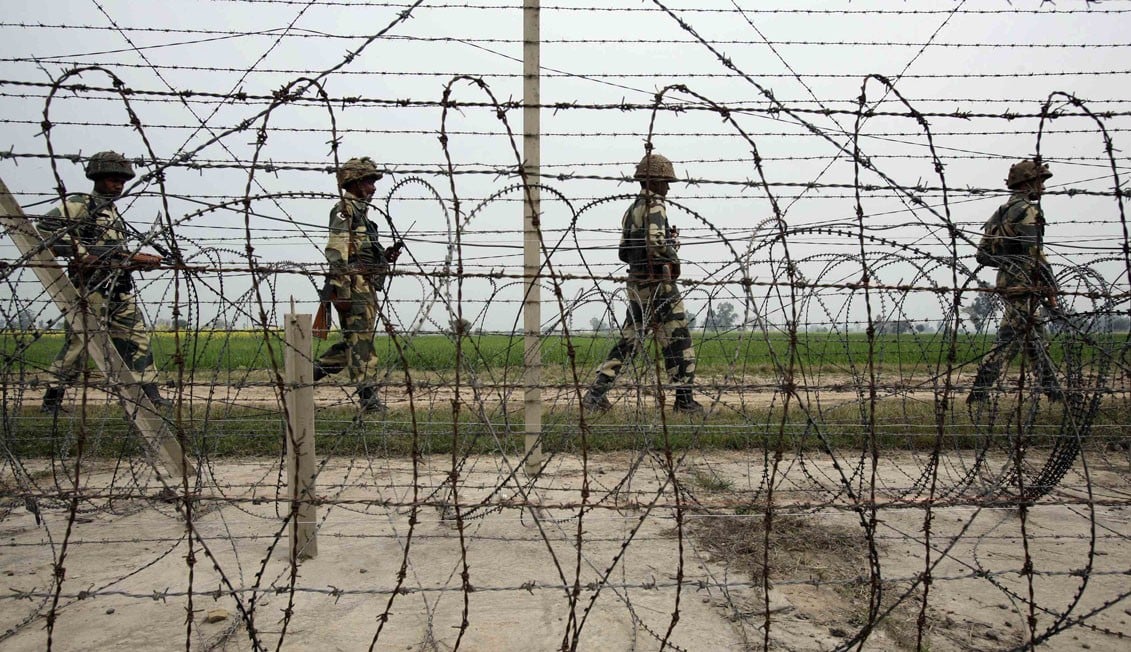
Skirmishes across the Line of Control necessitate meaningful engagement for peace between Pakistan and India

Though there is a realisation in both Pakistan and India that mutual cooperation is in their best interest, bilateral relations between the two neighbouring countries remain tense.
One feels impelled to draw this conclusion from various attempts made by both countries, over the years, to improve their bilateral relations. These attempts included Liaquat-Nehru Pact, Tashkent Agreement, Simla Agreement, cricket diplomacy, Lahore Declaration, Musharraf-Vajpayee joint declaration of 2004, Musharraf-Manmohan engagement, and recently Nawaz Sharif-Narendra Modi meeting.
In addition to frequent exchanges of firing and skirmishes across the Line of Control and international border, tense relations have resulted in three major wars between India and Pakistan. Resultantly, both the countries remain marred in abject poverty.
It is interesting to note that except for the Lahore Declaration, all major agreements of cooperation between the countries were made after a war. Like Liaquat-Nehru Pact after the 1947-1948 war, Tashkent Agreement came after the 1965 war, Simla Agreement after the 1971 war, and Zia’s cricket diplomacy after Brasstacks.
It was through his brilliant diplomacy during and after Brasstacks that General Ziaul Haq averted a conventional war in 1987 despite the fact that Indian General Sunderji was in full mood for war, and India’s young Prime Minister, Rajeev Gandhi, was also ready for a full-fledged war with Pakistan. General Musharraf also tried to ink a similar agreement after the Kargil war in the form of the Agra Accord. But, Musharraf’s efforts did not materialise due to Indian obduracy.
This shows that saner elements on both sides always thought that war was not a good option and contentious issues between the two countries needed to be resolved peacefully. However, unfortunately, so far, all steps for enhancing bilateral relations and creating sustainable peace between India and Pakistan, including Track-II diplomacy and "Aman ki Asha," have not yielded substantial results.
Meanwhile, growing cooperation between the US and India has encouraged New Delhi to aspire for a growing role at the global level, discarding old philosophies of non-alignment and strategic autonomy.
If India now reportedly seemed interested in joining hands with Pakistan against terrorism, as recently stated by that country’s Foreign Secretary in Singapore, permit me to point out that New Delhi was doing so to quell the Kashmiris’ yearning for independence. However, non-resolution of Jammu and Kashmir dispute and interference in Pakistan’s Balochistan province may continue to cast shadows over India’s global ambitions.
But, despite all setbacks, Modi-led BJP administration in India has been engaged in pursuing an aggressive policy aimed at bringing Pakistan to the status of a small pliant state and making it irrelevant to the regional and international scheme of things. However, Modi’s unrealistic policy of making Pakistan irrelevant has already failed; while Modi’s promised economic revolution is nowhere in sight, India’s honeymoon with the West has faded, and New Delhi is bound to fail in its efforts to change the status of Kashmir, as very aptly stated by Pakistan’s former Defence Secretary Lt. General (retd) Yasin Malik.
Given these setbacks, General Malik noted, Modi administration "has to find something to distract the Indian public opinion and easiest is confrontationist policy against Pakistan." He reminded that bullying is much easier than rapprochement and war easier than peace. General Malik was delivering his inaugural address at a conference on "Pakistan-India Relations: Post Congress Era," which was held in Islamabad under the auspices of Islamabad Policy Research Institute on August 4, 2015.
Pakistan has to adopt a very firm and consistent stance on Jammu and Kashmir and other contentious issues with India, asserted General Malik. Besides, Islamabad needs to firmly pursue the case of Indian involvement in terrorism in Pakistan, a fact that has been admitted even by many Indian officials. Likewise, the case of India’s military involvement in East Pakistan can also be pursued in international fora. Moreover, Islamabad will have to make Modi-led BJP administration realise that its policy of confrontation towards Pakistan would yield no dividends, and that Pakistan "is no easy prey for India."
In an overview of BJP’s one-year policy, defence analyst Said Nazir Mohmand noted that the US was building India to achieve its own global objectives. While aspiring for a role as a global player, India was competing with China short of confrontation, but with Pakistan it was pursuing a policy of confrontation.
Even independent media in India is critical of disproportionate show of force by the BJP administration that has brought Indo-Pakistan relations to the lowest level, observed Dr Arshee Saleem Hashmi.
In a situation like this, only peaceful means, like bilateralism or third party intervention, can help in resolving contentious issues between India and Pakistan, stated Ambassador (retd) Khalid Mehmood, Chairman Institute of Strategic Studies. He added that the composite dialogue could not yield results because it was not implemented sincerely and in true spirit. India wanted movement only on issues of its own choice, but the dialogue could have succeeded if there was movement on all concurrent issues, whether of interest to Pakistan or India.
If bilateralism was not working in removing irritants between India and Pakistan, there was no harm in going to other mechanisms, advocated another participant, Dr Mohammad Khan, head of IR Department at NDU.
If the governments of both countries seriously want to cooperate and enhance bilateral relations, there is need to set up a high-powered body, comprising 10-15 persons of good integrity and high repute from each side, to formulate some mutually agreed terms for peace. This body could comprise government representatives, international relations academicians, top media persons, retired generals and diplomats. After thorough considerations, this body could make recommendations for a peaceful relationship between India and Pakistan.
Peace between India and Pakistan could usher peace in South Asia and eliminate poverty from this populous region, inhabiting almost one-fourth of the global population.